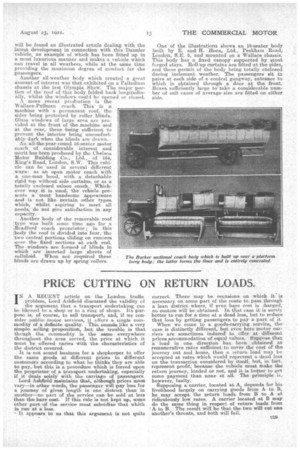PRICE CUTTING ON RETURN LOADS.
Page 15

If you've noticed an error in this article please click here to report it so we can fix it.
TN A RECENT article on the London traffic problem, Lord Ashfield discussed the validity of the argument that a transport undertaking can .be likened to a shop or to a ring of shops. Its Purpose is, of course, to sell transport, and, if we consider public motor services, it offers a single commodity of a definite quality. This sounds like a very simple. selling proposition, but the trouble is that though the commodity is the same . everywhere throughout the area served, the price at which_ it must be offered varies with the characteristics of the district covered.
It is not sound business for a. shopkeeper to offer the same goods at different prices to different customers according to what he thinks they are able to pay, but this is a procedui-e. which is forced upon the proprietor of_ a transport. undertaking, especially if it deals solely with the carriage of passengers. Lord Aslifaeld maintains that, although prices must vary—in other words, the passenger will pay less for a journey of given length in one district than in another—no part. of the service can be sold at less than the bare cost. If this rule is not kept up, some other part of the service must subsidize that which is run at a loss.
It appears to us that this argument is not quite correct. There may be occasions on •which it is necessary on some part of the route to pass through a lean district where, if even bare cost is 3harged, no custom will be obtained, in that ease it is surely better to run for a time at a dead loss, but to reduce that loss by getting passengers to pay a part of it.
When we come to a goods-carrying service, thecase is distinctly different, but even here motor carriers are sometimes induced to offer at • different prices accommodation of equal values. Suppose that a load in one direction has been obtained at remunerative rates sufficient to cover the cost of the journey out and home, then a return load may be accepted at rates which would represent a dead loss on the transaction considered by itself, but, in fact, represent profit, because the vehicle must make the return journey, loaded or not, and it is better to get some payment than none at all. The principle is,. however, faulty. Bupposing a carrier, located at A, depends for his livelihood largely on carrying goods from A to B, he may accept the return loads from B to A at ridiculously low rates. A carrier located at B may do the same thing in respect of return loads from A to B. The result will be that the two will cut one another's throats, and both will fail.
































